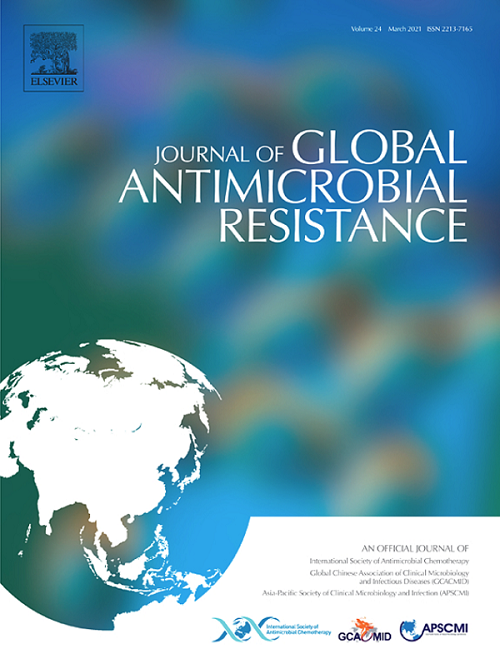Whole-genome sequencing analysis of Staphylococcus aureus isolated from female patients with mastitis in Henan, China
IF 3.7
3区 医学
Q2 INFECTIOUS DISEASES
引用次数: 0
Abstract
Objectives
To study the molecular characteristics, antibiotic resistance profiles and virulence features of Staphylococcus aureus (SA) isolates that cause mastitis.
Methods
117 SA isolates were collected from women with mastitis. Strain identification and antimicrobial susceptibility testing were conducted using the Vitek 2 system. All SA isolates were sequenced on the Illumina HiSeq platform. Multilocus sequence typing (MLST), ResFinder, BLAST against virulence factors, spaTyper, and SCCmecFinder were employed to analyse the strains.
Results
35 methicillin-resistant Staphylococcus aureus (MRSA) strains and 82 methicillin-sensitive Staphylococcus aureus (MSSA) strains were isolated from women with acute breast abscesses. The rates of resistance to various antibiotics were significantly higher among MRSA isolates than among MSSA isolates. 22 sequence types (STs), 35 staphylococcal protein A (spa) types, and 4 SCCmec types were identified. ST22, ST59, and ST398 were the major lineages, and t309 and t437 were the most common spa types. SCCmec-IVa was the predominant SCCmec type. Interestingly, toxin gene subtypes A (hlgA, hlgB, hlgC, lukF-PV, lukS-PV, seg, sei, sem, sen, seo, seu, n = 54), B (hlgA, hlgB, hlgC, seb, sek, seq, n = 13), C (hlgA, hlgB, hlgC, lukD, lukE, n = 10), and D (hlgA, hlgB, hlgC, n = 10) accounted for 74.4% (87/117) of all SA isolates, suggesting the high expression of virulence genes.
Conclusions
ST22, ST398, and ST59 are the main types that cause mastitis and have different virulence factor profiles. This study provides deeper insights into the molecular epidemiology of SA associated with acute mastitis.
河南女性乳腺炎金黄色葡萄球菌分离株全基因组测序分析
目的:研究引起乳腺炎的金黄色葡萄球菌(SA)分离株的分子特征、耐药谱和毒力特征。方法:从女性乳腺炎患者中采集117株SA。采用Vitek 2系统进行菌株鉴定和药敏试验。所有SA分离株在Illumina HiSeq平台上测序。多位点序列分型采用ResFinder、spaTyper和SCCmecFinder进行分析。结果:从急性乳腺脓肿患者中分离出35株耐甲氧西林金黄色葡萄球菌(MRSA)和82株甲氧西林敏感金黄色葡萄球菌(MSSA)。MRSA菌株对各种抗生素的耐药率明显高于MSSA菌株。鉴定出22种序列型(STs)、35种葡萄球菌蛋白A (spa)型和4种SCCmec型。ST22、ST59和ST398是主要的血统,t309和t437是最常见的spa类型。SCCmec- iva是SCCmec的主要类型。有趣的是,毒素基因亚型A (hlgA, hlgB, hlgC, lukF-PV, lukS-PV, seg, sei, sem, sen, seo, seu, n = 54),B (hlgA, hlgB, hlgC, seb, sek, seq, n = 13),C (hlgA, hlgB, hlgC, lukD, lukE, n = 10),D (hlgA, hlgB, hlgC, n = 10)占所有SA分离株的74.4%(87/117),表明毒力基因的高表达。结论:ST22、ST398和ST59是引起乳腺炎的主要类型,且具有不同的毒力因子谱。本研究为SA与急性乳腺炎相关的分子流行病学提供了更深入的见解。
本文章由计算机程序翻译,如有差异,请以英文原文为准。
求助全文
约1分钟内获得全文
求助全文
来源期刊

Journal of global antimicrobial resistance
INFECTIOUS DISEASES-PHARMACOLOGY & PHARMACY
CiteScore
8.70
自引率
2.20%
发文量
285
审稿时长
34 weeks
期刊介绍:
The Journal of Global Antimicrobial Resistance (JGAR) is a quarterly online journal run by an international Editorial Board that focuses on the global spread of antibiotic-resistant microbes.
JGAR is a dedicated journal for all professionals working in research, health care, the environment and animal infection control, aiming to track the resistance threat worldwide and provides a single voice devoted to antimicrobial resistance (AMR).
Featuring peer-reviewed and up to date research articles, reviews, short notes and hot topics JGAR covers the key topics related to antibacterial, antiviral, antifungal and antiparasitic resistance.
 求助内容:
求助内容: 应助结果提醒方式:
应助结果提醒方式:


